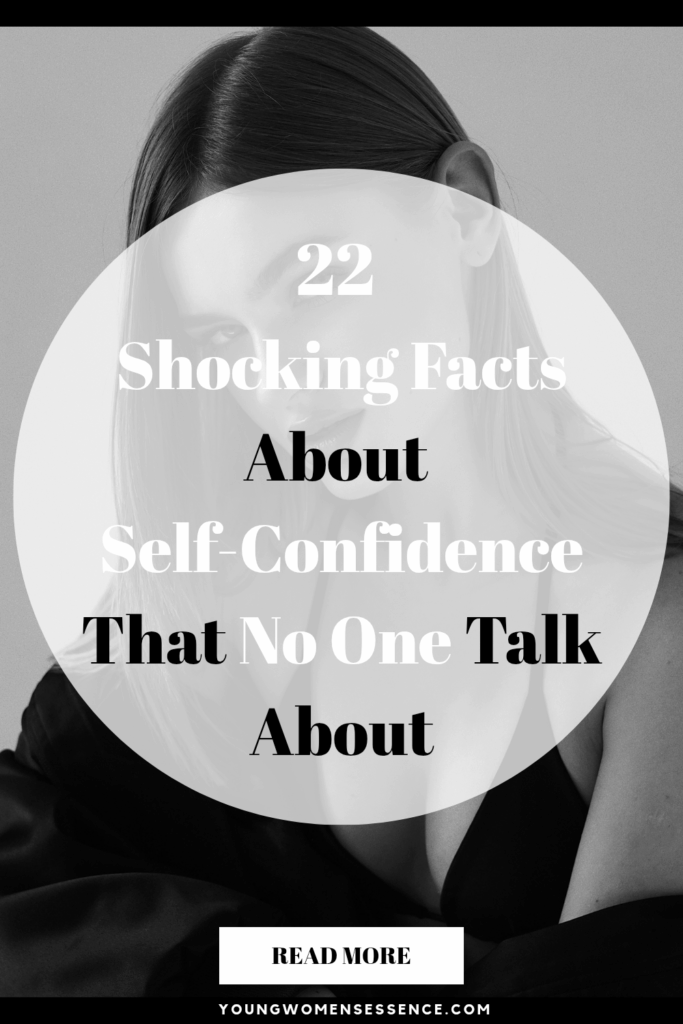Physical Address
304 North Cardinal St.
Dorchester Center, MA 02124
Physical Address
304 North Cardinal St.
Dorchester Center, MA 02124

What if I told you everything you know about confidence is incomplete? Confidence is more than just standing tall and being fearless. It’s a mixture of psychological, behavioral, and life experiences. In this post, we’ll explore 22 facts about self-confidence that no one hardly ever talks about.

One of the facts about self-confidence isn’t self-esteem. Although they are used interchangeably, self-confidence and self-esteem aren’t the same thing.
Self-confidence is believing in your abilities. However, self-esteem means knowing your value.
You can be confident and lack self-esteem and vice versa. For instance, you can be confident in public speaking but still struggle with your self-worth.
Sometimes we mistake the most extroverted or outspoken person in the room for being the most confident. However, this isn’t true being loud doesn’t mean being the most self-assured.
You can be quiet, steady, and reserved still have confidence.
You don’t have to be confident to be confident. In fact, many people who appear self-assured struggle with self-confidence they just pretend better.
Studies in behavioral psychology show that faking confidence results in the rewiring of your neurons which trick your brain into being confident. It’s the fake it until you make it effect.
Moreover, confidence is something you learn, not born with.
One of the facts about self-confidence is that you don’t need to be perfect. If you wait for perfect you’ll never be confident. Perfectionism kills progression.
Choose to be confident although you have flaws. True confidence-building is accepting your imperfections.
The reason why highly confident people are confident is because they choose to believe in themselves and step out of their comfort zone.
Every time you step out of your comfort zone you prove to yourself that you’re capable.
Our brains make a dialogue of our success which builds our confidence.
Think of confidence as strength exercises. The more you lift weights the stronger you become, this is also true for confidence the more you step out of your comfort zone, the more your confidence becomes stronger.
Being overly confident can be a cover-up of self-doubt or a defense mechanism. It doesn’t display true confidence and may come off as arrogant. In addition, overconfidence can be a cover up of imperfection and vulnerability.
True confidence is being grounded in yourself and cannot be performed.
We often compare our behind-the-scenes to someone’s highlight. Comparison isn’t just the thief of joy but is the thief of self-confidence.
Especially in the era of social media, we become prone to comparing ourselves with others. This is destructive to our self-worth and causes us to lose touch with reality.
Every time you compare yourself to someone, you lower your self-confidence.
The truth is everyone has a struggle and we look at their life from the outside.
Instead of comparing yourself to others focus on your self-growth and yourself.
One of the facts about self-confidence is that you’re more likely to fail more than everyone else.
Highly confident people are most likely to fail because they are willing to take more risks, but also they are people who are more likely to be successful.
Sometimes to be confident you have to allow yourself to fail and look ‘stupid’. Take your failures as feedback, never as who you are.
One day you can feel confident and the next not so confident, this is called a confidence dip.
The reality is confidence fluctuates, you can feel self-assured and able to take on the uncertain, and on the next, you can feel insecure and self-doubt.
However, this is the opportunity to be graceful towards yourself and put the fake it until you make it theory into action.
Improving your confidence in one area of your life can cause you to become confident in another area of your life. This is known as confidence transfer. For instance, if you’ve improved your social skills this can build your confidence in going on solo dates.
Set small wins in any area of your life and watch your confidence begin to overflow in your life.
One of the psychological facts about self-confidence is that your body language affects your brain to become self-assured.
When you sit up straight, hold your head high, and make eye contact this sends a signal to your brain that says, ‘I am confident and exude power.’
Has anyone ever said ‘You think you’re better than everyone else’ or ‘You’re so uppity’. Don’t take these statements personally especially if you know they aren’t true instead take them as someone projecting their insecurities on you.
Being self-assured sometimes puts a target on your back because some people might find it intimidating. However, never belittle yourself for these types of people to feel comfortable in your presence.
As a child were you encouraged, validated, and had the freedom to try new things and be yourself? If not, it’s okay you can heal your inner child to boost your confidence.
Your upbringing has a lot to do with your confidence as an adult.
One of the facts about self-confidence is that sometimes you have to do things in the face of fear and uncertainty. Self-confidence is daring.
Confident people also feel fear or hesitation but still choose to take action they figure it out along the way.
Therefore, confidence is build by doing.
Confident people are more likely to take care of themselves. They prioritize fitness and wellness.
Studies have shown that having confidence improves health. Confident people experience lower stress levels and they tend to make better decisions.
Self-confidence is transmittable. When you’re a confident person others get inspired and trust you more. Your self-assurance can rub off on others. As a result, becoming a reflection of your energy.
Hence, your confidence not only affects you but it affects others around you.
One of the facts about self-confidence it doesn’t seek others’ approval. Seeking approval, validation, or applause from others can cause you to lack self-confidence. When you’re seeking to please people you’re not embodying your authentic self.
Also, You don’t have to be the smartest or most likable person in the room. Allow others to shine without getting offended.
Being confident is moving in silence and security.
When you have self-confidence others tend to treat you better. People often respond to your energy and the way you carry yourself. Hence, your self-confidence sets the tone for how others treat you.
Self-value brings value from others.
One of the facts about self-confidence that no one talks about is that when you’re confident you set boundaries to protect your energy. Moreover, you tend to remove yourself from toxic environments and avoid being around insecure people.
One of the psychological facts about self-confidence that no one discusses is that you can reprogram your brain to becoming confident.
You can cultivate confidence using Neuroplasticity which allows you to reshape your thinking patterns.
You can rewire your thinking through affirmations, visualization, and accomplishing small wins to build self-confidence.
The key to confidence is taking action. Self-assurance is the result of movement. Therefore, start scared, unsure, or uncertain.
One of the facts about self-confidence is that it isn’t self-indulging. Being confident isn’t being full of yourself or egotistical. It’s about self-respect and not self-obsession.
There is much more to learn about self-confidence. Confidence goes deeper than the surface. It is a mixture of your life experiences, mindset, and behavior. Listed above are 22 facts about self-confidence that no one talks about that can change your perspective.